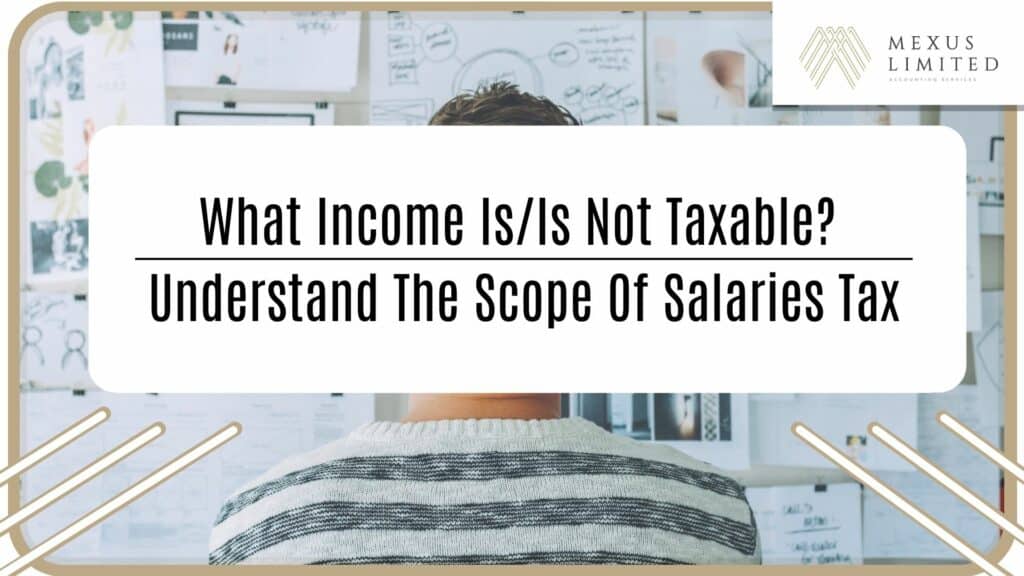What income is/is not taxable? Understand the scope of salaries tax

Taxpayers with tax filing experience may know that salaries tax in Hong Kong is assessed based on “income”. Therefore, if you understand how the Inland Revenue Department defines “income”, you will be able to understand the taxable scope of salaries tax. Moreover, most of the income generated in or derived from Hong Kong is subject to taxation. What is included and what is not included in this scope? This article will introduce them one by one.
What “income” is taxable? Salaries tax taxable scope:
According to the Inland Revenue Ordinance, all income taxpayers (regardless of employers and employees) are required to declare their respective incomes to the Inland Revenue Department. It should be reminded that if the taxpayer fails to report or underreport the income without reasonable excuse, it may incur heavy fines and additional taxes.
Although many members of the public already know that multiple incomes, such as salaries, wages, directors’ remuneration, etc., will be declared in the tax return for individuals (BIR60), but what are the bureau’s definition and rules of “fixing”? The following are the areas of “income” that are taxable:
- Salary/Wage
The income of working persons includes their salaries/wages and refers to all income before contributions to mandatory provident fund schemes or recognized occupational retirement schemes.
- Commissions, bonuses, wages in lieu of vacations, contract completion gratuities
In general, all payments made by employers to employees are subject to salaries tax. If the payment is made to the employee in accordance with the employment contract, or when the employee is in office, before joining or after leaving the company, whether the payment is voluntarily paid by the employer or not, it is basically within the scope of salaries tax.
A few items accrued before March 31, 2012, as well as some work-related accident compensations, etc., are the same as income, except for a few items that are not subject to taxation stipulated by the law.
- Allowances, additional rewards, and fringe benefits
In terms of the interpretation of the Inland Revenue Ordinance, it is not easy to determine the above amount. However, all allowances, additional rewards, and fringe benefits declared in tax returns, provided by employers, such as cash allowances for meals, transportation, housing, etc., benefits or rewards that can be exchanged for money (gifts of cars, stocks, etc.), educational benefits, the employer’s performance of personal legal responsibilities for the employee, etc., should be included in the income.
- Other income
In addition to the above-mentioned income, there are many other income payments that may be overlooked:
• Tips from anyone (e.g. restaurant tips, tour guide tips);
• Salaries tax paid by employers on behalf of employees;
• share awards and share option benefits;
• the “rent value” of the accommodation provided;
• Back-payment of salaries, wages, gratuities, and awards or gratuities for retired service;
• Payment in lieu of notice agreed upon in the employment contract or paid to the employee under section 7 of the Employment Ordinance (Cap. 57);
• Payments received from retirement plans.
Tax-free “income”?
The following income is not taxable and means that the taxpayer does not need to report it in the tax return, including severance payment and long service payment. Severance payments or long service payments received under the Employment Ordinance are not taxable.
However, if the severance payment or long service payment received by the taxpayer is greater than the amount under the Employment Ordinance, both the employee and the employer are required to declare and pay salaries tax on the excess.
Another non-taxable income is the allowance for becoming a juror, which means that taxpayers are not required to declare and pay salaries tax on any income earned by serving as a court juror.
The above information is for reference only. If you have any questions about tax declaration and accounting, we welcome your inquiries.


